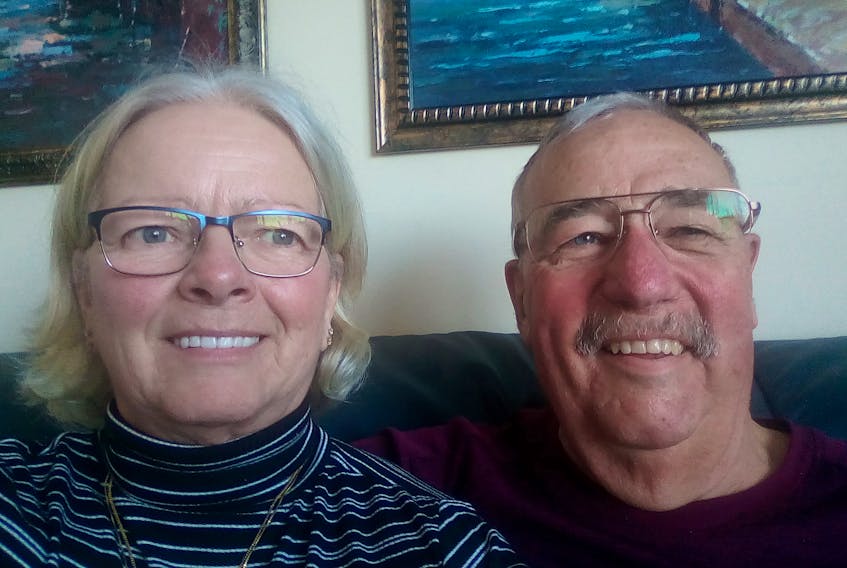Less than 48 hours after having a stroke, Rick Anscomb couldn’t tell you the time of day.
But that didn’t stop the Nova Scotia Health Authority from having him sign documents to authorize billing for a semi-private room.
“They’re telling me he asked for that. I’m telling you he didn’t. He was in no state,” Sharon Anscomb, Rick’s wife, said in a recent interview.
“He didn’t know if it was breakfast time or supper time. He wasn’t even ordering breakfast, so I don’t know how he would’ve done that.”
In the early morning hours of Dec. 11, Sharon woke up to Rick struggling to get out of bed in their Kingston home.
Rick was rushed to the Valley Regional Hospital, where he was told by doctors he would never be able to walk again because of the stroke.
“He was completely paralyzed on his left side for the first 20 hours or so and his speech wasn’t terribly impaired, but he didn’t really know where he was or what was going on,” Sharon said.
"When I got the email copy, it looked like a drunken sailor had signed it."
- Sharon Anscomb
Rick stayed in a semi-private room for three days while he waited to have surgery on his carotid artery. During his 12-day stay at the Kentville hospital, Sharon said the care for Rick was above and beyond.
“His nursing staff was amazing, the stroke team was incredible, the vascular surgeon was incredible and the food was good, so at the time everything was amazing,” she said.
But this week, the Anscombs received a bill from the Nova Scotia Health Authority for the remaining $90 for a three-day stay in a semi-private room.
“The bill shows that they had invoiced my insurance company for $420 because my husband had signed some kind of a request for a specific room,” Sharon said.
“So I called the number that was on the invoice and the woman said, ‘Well, we have a request for a specific room signed by your husband.’”
Standard ward rooms containing three to four beds are covered by Nova Scotia’s health insurance program, but patients can request a semi-private or private room for a price, according to the Nova Scotia Health Authority’s website.
Patients may be placed in a private or semi-private room without charge for operational or medical reasons, but will be charged if the room placement is by request.
“Private and semi-private rooms generate revenue to support hospital programs, training and education and equipment upgrades,” NSHA’s website says.
"We would then assign someone with a clinical background and knowledge of the patient’s case to review the chart and advise about the patient’s capacity to consent."
- NSHA spokesman Brendan Elliott
Sharon, who spent nine hours a day at the hospital with her husband and was unaware of his supposed request, asked the woman to send her the signed document.
“When I got the email copy, it looked like a drunken sailor had signed it,” Sharon said.
“I made her laugh because I said, did you sell him the Brooklyn Bridge? What else did you get him to sign for?”
According to Rick, all he remembers is “ it being very cold,” but he doesn’t remember signing any papers.
During a followup appointment on Wednesday, the couple’s family doctor said Rick “would not have been in a position to make a decision regarding that and probably would have signed anything put in front of him,” Sharon said.
Brendan Elliott, NSHA spokesman, was unable to comment on Anscomb's case for patient confidentiality reasons, but he recommended if someone has a complaint or concern surrounding a patient's mental capacity while signing a document, to call NSHA at the phone number on the bill.
"We would then assign someone with a clinical background and knowledge of the patient’s case to review the chart and advise about the patient’s capacity to consent," Elliott said.
"If a bill is found to be valid, NSHA does have payment plans available if affordability is an issue."
Elliott said any patients with concerns are encouraged to call the toll-free NSHA patient relations contact line at 1-844-884-4177.
But to Sharon, it’s not the money that matters.
“We can afford to pay it. It’s just the principle of the thing that’s bothering me. I don’t understand how this happened,” she said.









